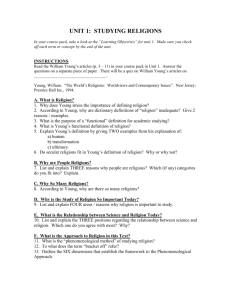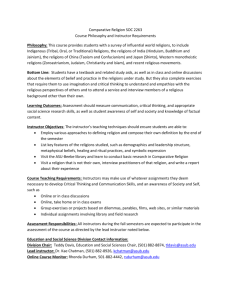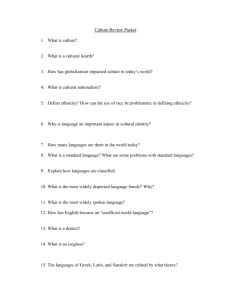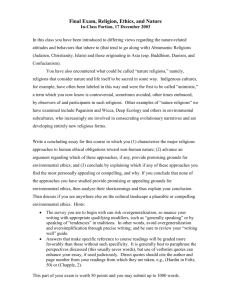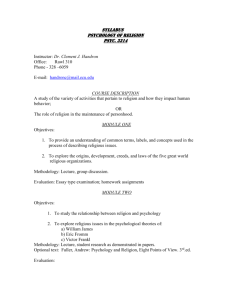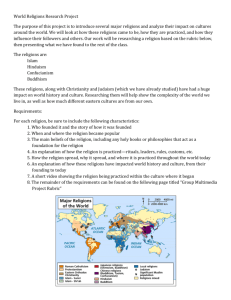World Religions - Wayland Baptist University
advertisement
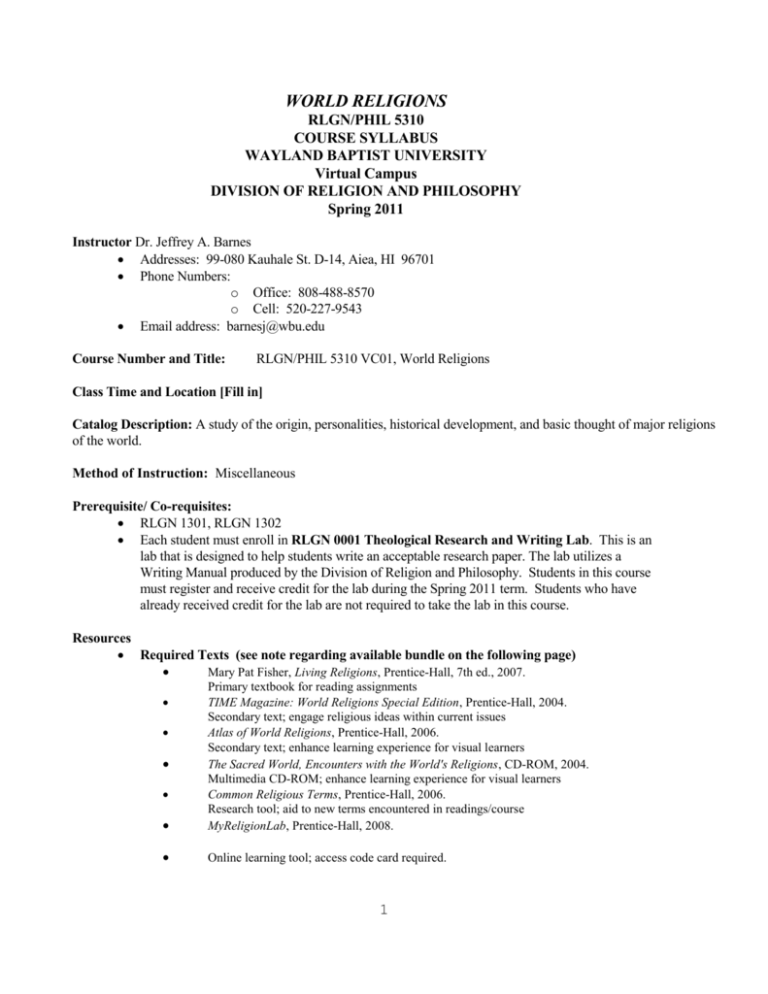
WORLD RELIGIONS RLGN/PHIL 5310 COURSE SYLLABUS WAYLAND BAPTIST UNIVERSITY Virtual Campus DIVISION OF RELIGION AND PHILOSOPHY Spring 2011 Instructor Dr. Jeffrey A. Barnes Addresses: 99-080 Kauhale St. D-14, Aiea, HI 96701 Phone Numbers: o Office: 808-488-8570 o Cell: 520-227-9543 Email address: barnesj@wbu.edu Course Number and Title: RLGN/PHIL 5310 VC01, World Religions Class Time and Location [Fill in] Catalog Description: A study of the origin, personalities, historical development, and basic thought of major religions of the world. Method of Instruction: Miscellaneous Prerequisite/ Co-requisites: RLGN 1301, RLGN 1302 Each student must enroll in RLGN 0001 Theological Research and Writing Lab. This is an lab that is designed to help students write an acceptable research paper. The lab utilizes a Writing Manual produced by the Division of Religion and Philosophy. Students in this course must register and receive credit for the lab during the Spring 2011 term. Students who have already received credit for the lab are not required to take the lab in this course. Resources Required Texts (see note regarding available bundle on the following page) Mary Pat Fisher, Living Religions, Prentice-Hall, 7th ed., 2007. Primary textbook for reading assignments TIME Magazine: World Religions Special Edition, Prentice-Hall, 2004. Secondary text; engage religious ideas within current issues Atlas of World Religions, Prentice-Hall, 2006. Secondary text; enhance learning experience for visual learners The Sacred World, Encounters with the World's Religions, CD-ROM, 2004. Multimedia CD-ROM; enhance learning experience for visual learners Common Religious Terms, Prentice-Hall, 2006. Research tool; aid to new terms encountered in readings/course MyReligionLab, Prentice-Hall, 2008. Online learning tool; access code card required. 1 These items are packaged as a bundle from Prentice-Hall. ISBN: 978-0-205-78528-5. Bundle is available through WBU bookstore. All elements of the bundle will be utilized during the course of the term. Several items are only available through this bundle. Course Outline and Calendar Week 1 Religious Responses Week 2 Indigenous Sacred Ways Week 3 Hinduism Week 4 Jainism & Buddhism Week 5 Chinese & Japanese Religions Week 6 Midterm Exam Week 7 Zoroastrianism & Judaism Week 8 Christianity Week 9 Finish Research Paper Week 10 Islam & Sikhism Week 11 Final Exam Course Outcome Competencies: Students will: 1. Be able to identify the fundamental beliefs and define the basic vocabulary of the major world religions. 2. Be able to discuss the significant historical events, persons, and groups related to the origin and development of the major world religions. 3. Be able to identify areas of commonality and difference between Christianity and the other major world religions which might promote an effective witness. Course Requirements: Weekly Reading Exercises. Student participation in class discussion boards will enrich the class. (See the Attendance Policy above for issues related to grade.) Discussion Boards and Wikis will be used for class interaction on reading assignments. For discussion boards, students are expected to post at least one substantive posting for each question/issue thread on each assigned chapter. For wikis, students are expected to provide at least one substantive contribution for each assigned wiki assignment. Such responses are expected within a timely manner during the original week assigned. Late responses to chapter questions will not achieve the desired result of interaction among peers, so they will be graded down one letter grade if they are not submitted during the assigned week. In addition, students will be expected to interact with one another on the chapter discussion boards. Such interaction can take the form of questions to other students about their statements responses to questions raised by other students and/or the instructor to one’s own statements discussion of additional issues within the chapter of interest to the student Such interaction should be conducted during the week a chapter is read, however, conversations will often continue throughout the course of the semester. At times, the instructor may state that a certain number of responses are expected. NOTE: Because the university classroom is a place designed for the free exchange of ideas, students are encouraged to think aloud and to be honest about their theological perspectives and concerns. Students should respect the views of their peers, addressing any concerns or questions about another’s views with charity and compassion, so that the whole body of Christ might be built up (Eph. 4:11-15). 2 2. Weekly Investigative Exercises. Students will have the opportunity to investigate the week’s religion(s) in more depth through investigative discussion boards and/or blogs. Some investigative boards will be assigned for all students to participate in. Other exercises will have options that will allow each student to investigate one or more topics of interest. On these exercises, at least one substantive posting is expected for each question/issue as requested on the exercise. Such postings are expected within a timely manner during the original week assigned, yet the individual investigative nature of some of the boards will allow for late responses with no penalty to the student. Student interaction on the investigative boards is not required unless stated in the weekly assignment. Students may voluntarily interact with others as they have time or interest. 3. Examinations. There will be two exams for the course. The questions will be over reading assignments, slide shows and handouts posted during the week, and class discussion on discussion boards. The majority of the exam questions will be based on the MyReligionKit practice quizzes and CD-ROM practice quizzes. The rest of the questions will be based on class discussion and slide shows/handouts. MAKEUPS. Students must secure permission to not to take the exam at the scheduled time prior to the conclusion of the testing period. Because the testing is given over a period of time, late testing will only be allowed in the most unusual of circumstances. WEEKLY PRACTICE QUESTIONS. To help ensure that you comprehend the essential material in each chapter, you may take the practice quizzes through the MyReligionKit website and the Sacred World CD-ROM companion website as practice for the midterm and final. A majority of the exam questions will be based on these practice quizzes, so hopefully the more you are able to practice them, the better you will know the material for the exams. 4 3 4. Field Trip Participation. Students will attend at least one worship service/meeting of another faith to provide an opportunity to encounter "real-life" adherents of other religions rather than just scholarly statements/analysis of these religions. You will submit a 3-5 page report on what was observed, how it fit in with what you have studied of the faith, and how the things you observed are similar/different from your own faith. Extra credit will be added to the assignment if you provide: a. evidence in your report of substantive interviews/discussions with the clergy/laity of that religion b. photos and/or video accompanying the report (video may have to be submitted separately—contact instructor.) Please ask permission to use cameras, however. Some religions will not allow you to do this part of the exercise. Students will be awarded up to two (2) bonus points on their final semester average for each additional field trip they attend and submit a report. MAKEUPS. Students should plan early to complete the required trips. Students need to contact instructor immediately if they foresee that they will have difficulties completing this assignment so that the instructor can assist in resolving the issue or in developing a comparable alternative exercise. 5. Research Paper. All students will write a quality research paper of 20-25 pages of text (not counting frontal material and bibliography) about a major doctrine, key figure, or significant movement within a selected religion. Course Evaluation University Grading System A 90-100 B 80-89 C 70-79 D 60-69 F BELOW 60 I INCOMPLETE** Cr FOR CREDIT NCr NO CREDIT WP WITHDRAWAL PASSING WF WITHDRAWAL FAILING W WITHDRAWAL **A grade of incomplete is changed if the deficiency is made up by midterm of the next regular semester; otherwise, it becomes "F". This grade is given only if circumstances beyond the student's control prevented completion of work during the semester enrolled and attendance requirements have been met. A grade of "CR" indicates that credit in semester hours was granted but no grade or grade points were recorded. Procedure for computations of final grade Quality and quantity of discussion on weekly reading exercises.....................................................................20% Quality of participation in investigative exercises...........................................................................................10% Demonstrated knowledge through two examinations......................................................................................30% Quality of experiential knowledge gained from participation in field trip......................................................10% Quality of research paper.................................................................................................... .............................30% Academic Honesty (Plagiarism): University students are expected to conduct themselves according to the highest standards of academic honesty. Academic misconduct for which a student is subject to penalty includes all forms of cheating, such as illicit possession of examinations or examination materials, forgery, or plagiarism. Plagiarism is the presentation pf the work of another as one’s own work. It is the student’s responsibility to be familiar with penalties associates with plagiarism stated in the catalog. 4 Services for the Disabled It is university policy that no otherwise qualified disabled person be excluded from participation in, be denied the benefits of, or be subject to discrimination under any educational program or activity in the University. The Dean of Students serves the University as coordinator or activities for the handicapped and should be contacted concerning initial contact with the Dean of Student’s office as soon as possible before registration to ensure adequate time for assistance. 5

